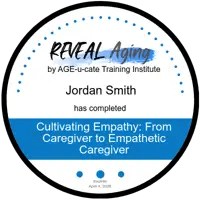
Digital credentials, such as badges and certificates, are really useful in today's world where a lot of what we do is online.



They let you easily show off your achievements in areas where you excel.
This can help when you're looking for a job or want to stand out. You can share them on websites like LinkedIn, where people go to find job opportunities or connect with other professionals. This can make you look more appealing to employers because they can see your skills and achievements right away.
They encourage you to keep learning new things as you collect more badges over time.
Schools and companies like using them because they can quickly see and celebrate what you've learned in a way that fits into our digital world. Basically, digital credentials help connect what you learn with the jobs and opportunities out there, giving you a head start in planning your future career.
Here are several reasons why digital badges and certificates are significant for learners:
Digital badges provide a visual and verifiable way to display a learner's skills, knowledge, or achievements. They allow for the acknowledgment of both formal education and informal learning experiences.
Earning badges and certificates can motivate learners to set and achieve goals, engaging them more deeply in the learning process. They introduce a gamification element to learning, making it more interactive and fun.
Badges can enhance a learner's resume by providing evidence of specific skills and competencies to potential employers. They signal to employers that a candidate is committed to continuous learning and professional development.
Digital badges are easily shareable on social media, digital CVs, and professional networking sites like LinkedIn. They provide a portable and accessible way for learners to showcase their achievements across various platforms.
Badges and certificates can help learners identify and pursue personalized learning paths based on their interests and career aspirations. They encourage learners to seek out specific skills and knowledge areas, promoting a more tailored educational experience.
Some digital badges are linked to specific opportunities, such as advanced courses, internships, or job openings, acting as prerequisites or recommendations. They can unlock new learning and career opportunities that might not have been accessible otherwise.
Digital badges support the concept of lifelong learning by encouraging individuals to continue acquiring new skills and knowledge throughout their lives. They reflect a commitment to ongoing personal and professional development.
Badges often contain metadata about how, when, and by whom they were earned, providing credibility and verification of the learner's achievements. This transparency helps in establishing trust with educational institutions and employers.
Earning badges can connect learners to a community of individuals with similar interests or skills. This can facilitate networking opportunities, collaboration, and the sharing of ideas and resources.
Digital badges and certificates can help democratize education by recognizing the value of diverse learning experiences, including those obtained outside traditional educational settings. They can play a role in bridging the gap between formal education and informal learning, making education more inclusive.

